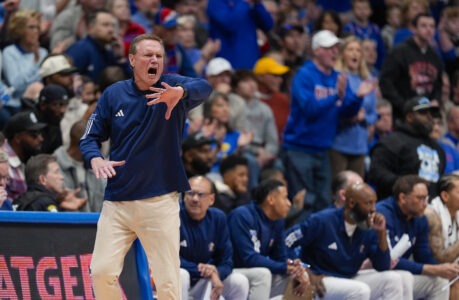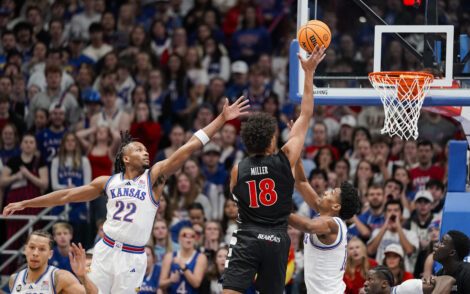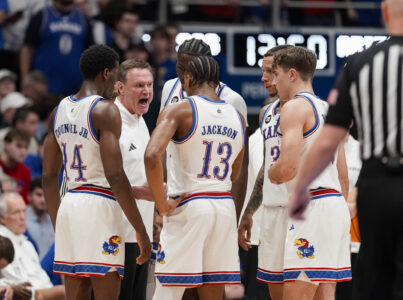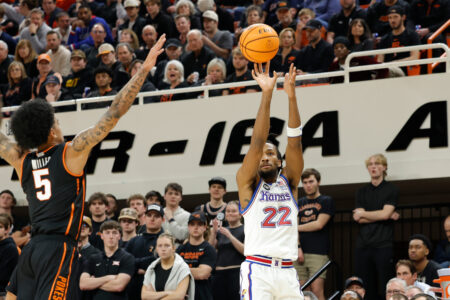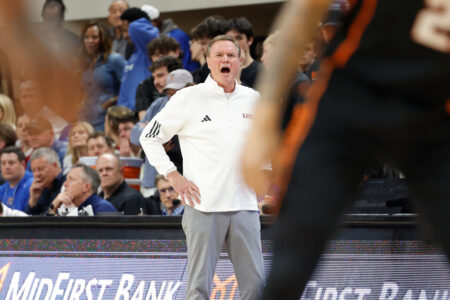How the new JUCO eligibility waiver could affect KU athletes

Kansas guard David Coit (8) pulls up for a 3 against North Carolina State guard Marcus Hill (10) during the first half on Saturday, Dec. 14, 2024 at Allen Fieldhouse. Photo by Nick Krug
Just as the eligibility situation for college athletes seemed close to resolving back to what it once was — five years to play four — a new wrinkle complicated matters further on Dec. 23.
Lawyers for Vanderbilt quarterback Diego Pavia recently argued successfully in a federal antitrust case that Pavia’s tenure at New Mexico Military Institute, a junior college, should not count toward his overall collegiate eligibility, essentially because it restricts his economic opportunities as an NCAA athlete.
Pavia earned an injunction to play another year of college football. The NCAA said it will appeal the decision, but in the meantime granted on Dec. 23 a waiver for former athletes at non-NCAA schools whose eligibility will expire during the 2024-25 academic year to play in 2025-26 as well.
Needless to say, this restores a significant portion of the collegiate talent pool, just as the number of players with additional eligibility due to the 2020-21 COVID-19 waiver is starting to dwindle, and just as teams are reshaping their rosters in advance of another legal decision, the House settlement, which will impose new roster limits on every NCAA sport in place of previous scholarship limits.
Inevitably, this new wrinkle will affect Kansas, both by adding unexpected talent to the transfer pool and giving a few Jayhawks’ collegiate careers new life, providing them the opportunity to come back if it fits with their and their coaching staff’s plans. In the days since the waiver, numerous players across the country who thought their careers had ended have now had to reevaluate their plans for 2025.
“I don’t know that it’s bothersome to me, as far as a wrinkle, because I think it’s far enough out,” said KU men’s basketball coach Bill Self, who acknowledged his team could potentially bring back guard David Coit for another season. “Now if they made this decision after the portal was open, and after you signed guys in the portal then you make the decision, then you say, ‘God, if I’d had known that, I wouldn’t have done this.’ … The fact that we know now, now the portal recruiting will be based on what we know.”
At least at the moment — pending further earth-shaking legal action — this waiver only applies to players who specifically are about to exhaust their eligibility. That means, for example, that KU football defensive end Dean Miller, whose final year of eligibility is 2025-26, isn’t guaranteed to be able to come back for 2026-27 because of this ruling. In addition, the waiver — again, as of now — provides a reprieve for one year, not the cumulative number of years an athlete actually spent at a non-NCAA school.
With that in mind, here are some examples of KU athletes who could be, in fact, directly affected by the NCAA’s decision. A couple are in baseball, where head coach Dan Fitzgerald has made a living at the JUCO level and recruited three consecutive No. 1 JUCO classes. All selections are based on KU’s public accounting of athletes’ eligibility, in combination with those athletes’ prior institutions’.

photo by: AP Photo/Colin E. Braley
Kansas guard David Coit (8) during an NCAA college basketball game, Saturday, Nov. 16, 2024, in Lawrence.
David Coit: Self mentioned KU could get Coit back, and so it’s another spin of the wheel in the unusual career of the 5-foot-11 guard, who has said he spent some time delivering pizzas during the pandemic thinking his basketball career was over, even before he went to junior college following a stint at a post-graduate prep school. Then his career almost ended again prior to 2024-25, essentially because of administrative errors by his former institutions and Coit himself in documenting his time at that prep school, as he explained on a recent episode of “Hawk Talk,” stating that he was “miseducated” about the process.
Coit ended up needing a late-summer eligibility waiver just to play a fourth year of college basketball and complete his transfer away from Northern Illinois (and he was originally supposed to go to Texas A&M before KU came back into the picture). Now, he could tack on a fifth if he so chose.
The native of Columbus, New Jersey, is currently averaging 5.6 points in 18 minutes per game and playing pesky defense as a key role player for this year’s Jayhawks.

photo by: Mike Gunnoe/Special to the Journal-World
Kansas outfielder Mike Koszewski catches a fly ball against Houston on Saturday, May 11th, 2024, at Hoglund Ballpark in Lawrence.
Mike Koszewski: One of just a few key returnees in the field for this year’s KU baseball team, Koszewski, a native of Oakbrook, Ill., spent the COVID-affected season at Cincinnati, then played 67 games at Wabash Valley Community College before starting 74 over the last two seasons for the Jayhawks. The 2025 campaign will be his third in Lawrence and, until the waiver, appeared to be his last.
Of course, baseball can be unpredictable in terms of when players choose to depart for the MLB Draft, and then whether they choose to come back if they are selected. But if needed, Koszewski would have the opportunity to play college ball again in 2026. The corner outfielder hit .300 with 18 RBIs for the Jayhawks in 2024.

photo by: Mike Gunnoe/Special to the Journal-World
Kansas infielder Chase Diggins tosses the ball to first for an out against Houston on Saturday, May 11th, 2024, at Hoglund Ballpark in Lawrence.
Chase Diggins: An Australian who went to school in Japan, Diggins joined the Jayhawks for the 2024 season after two years at Odessa College in the JUCO ranks, meaning he has the most straightforward eligibility situation of just about anyone involved in this ruling.
Last year he missed a chunk of the middle of the season but ended up starting in 24 of his 26 appearances, batting .291 with three home runs and 16 RBIs. His true senior year will be 2025, meaning he will, in fact, have another year if he wants it.

photo by: Carter Gaskins/Special to the Journal-World
Kansas tight end Tevita Ahoafi-Noa during practice on Saturday, March 30, 2024, in Lawrence.
Tevita Ahoafi-Noa: A sixth-year senior on the KU football team in 2024, Ahoafi-Noa saw his first notable playing time as a blocking tight end, and eventually made his first career catch in the season finale against Baylor, only to fumble. He played 103 offensive snaps on the season behind Jared Casey and Trevor Kardell with one start.
The native of Salt Lake City, who graduated high school in 2017, had previously redshirted in 2023 after seeing minimal action on offense in 2022, his first year with the Jayhawks.

photo by: Kahner Sampson/Special to the Journal-World
KU defensive end Ronald McGee (99) is joined by teammates as they celebrate a big tackle against Iowa State at Arrowhead Stadium in Kansas City, Mo., on Saturday, Nov. 9, 2024.
Ronald McGee: McGee was already playing his seventh season of college football in 2024 after suffering a season-ending torn ACL during 2023 training camp. After beginning his career at Highland Community College and then getting recruited to Buffalo by Lance Leipold’s staff, he eventually joined the Jayhawks as a defensive tackle before making the move to end later in his career.
McGee played in just five games from 2021 to 2023 but appeared in six more with 48 defensive snaps as KU’s third-choice strong-side defensive end this past season. He had a key stop for no gain on Iowa State quarterback Rocco Becht on Nov. 9 and finished the year with four tackles overall.

photo by: Chance Parker/Journal-World photo
Kansas junior Alex Raich runs through drills during the first day of Fall Camp on Tuesday, Aug. 1, 2023.
Alex Raich: Another player with a winding road to Lawrence, Raich was a key special teamer in 2024 but only saw 33 snaps on defense, the majority of which came in one game against UNLV, and tallied five tackles on the year.
By the time Raich came to Lawrence, he had already played for the Calanda Broncos football team in his native Switzerland and then moved to the United States on his own to join the Golden West College team at the JUCO level. With the Rustlers, after making the move to defense from wide receiver, he racked up 71 combined tackles in two seasons (2019 and 2021) before joining KU as a hybrid Hawk linebacker in 2022.
Others
Sprinter Deshana Skeete of the KU women’s track and field team, a third-place finisher in the women’s 400 meters at the Kansas Relays last year and part of the bronze-medal 4×400 relay team at the Big 12 Outdoor Championship, started her career at New Mexico Junior College and could take advantage of the ruling. Other apparent candidates in this realm include Marcus Freeman Jr. of men’s track and field, a transfer from Fort Scott Community College, and graduate student Caroline Horning of the KU women’s cross-country team, who began her career in the National Association of Intercollegiate Athletics at Friends University before transferring to KU.
The NCAA’s reference in its ruling to playing at “a non-NCAA school” suggests that not only former JUCO athletes but also those who played in the NAIA get another year. The NAIA-to-NCAA jump is rare, but KU baseball pitcher Thaniel Trumper also made it ahead of the 2023 season (Fitzgerald’s first) from Doane University in Crete, Nebraska, to KU. While Trumper debuted in the COVID-affected 2021 season, according to his KU profile he transferred in with two years of eligibility remaining. The righty led all Jayhawk pitchers with 30 appearances in 2023, his junior season, and finished with a 4.47 ERA in 58 1/3 innings pitched. He was limited to three appearances in 2024, though, and is now listed as a redshirt senior on the Jayhawks’ roster.
There could also be some ambiguity in the case of KU football tight end DeShawn Hanika, who by all accounts will be back for a seventh season of college football in 2025 one way or another. However, since he already redshirted when he was at Butler Community College in 2019, the additional eligibility beyond 2024 seemed like it had to come as a result of a medical redshirt for 2024, after he missed the entire season due to a leg injury suffered during spring practice. Now, though, he could have been eligible for 2025 either way. Since medical waivers typically come into effect at the conclusion of a career, then, he might have a case for an eighth season in 2026 when all is said and done — barring any additional changes to eligibility rules.


